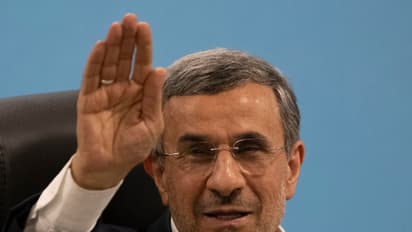EXPLOSIVE! Iranian secret service chief tasked with targeting Mossad was Israeli agent, claims Ahmadinejad

Synopsis
Former Iranian President Mahmoud Ahmadinejad has claimed that the head of an Iranian intelligence unit established to target Mossad agents was himself an Israeli double agent.
In a stunning revelation, former Iranian President Mahmoud Ahmadinejad has claimed that the head of an Iranian intelligence unit established to target Mossad agents was himself an Israeli double agent. In an interview with CNN Turk, Ahmadinejad alleged that this individual, along with 20 other agents, turned against Tehran and provided sensitive intelligence to Israel, potentially compromising Iran’s nuclear program and security operations.
Ahmadinejad, known for his controversial hardline stance and vocal opposition to Israel, suggested that the infiltration of Iranian intelligence was directly tied to several major Israeli intelligence successes within Iran. He specifically referenced the 2018 heist in which Mossad operatives stole documents from Tehran detailing the Iranian nuclear program. These documents were later presented by Israeli Prime Minister Benjamin Netanyahu, leading to heightened tensions and, according to some reports, influencing the decision of then-U.S. President Donald Trump to withdraw from the 2015 nuclear accord.
According to Ahmadinejad, the Iranian counterintelligence unit, designed to root out Israeli espionage, was instead deeply compromised. The alleged double agents reportedly shared critical details about the country’s nuclear initiatives and security operations with Israel. Ahmadinejad stated that while the head of the unit was exposed as a double agent in 2021, he and his associates successfully fled Iran and are currently residing in Israel.
The former president’s claims echo long-standing concerns within the Iranian leadership about the extent of Israeli espionage operations within the Islamic Republic. Other Iranian officials have publicly expressed fears of Mossad's penetration. In 2022, a former Iranian minister, who served under former President Hassan Rouhani, warned that senior officials should be concerned for their lives due to Mossad’s alleged infiltration into Tehran’s inner circles.
Ahmadinejad’s allegations also shed light on Mossad’s success in conducting operations inside Iran. One of the most notable incidents was the 2018 operation where a vast trove of Iranian nuclear documents was seized and smuggled to Israel. This mission is believed to have played a role in convincing key international players to reconsider their stance on Iran’s nuclear ambitions, particularly influencing the US's decision to abandon the Joint Comprehensive Plan of Action (JCPOA).
Further, Ahmadinejad insinuated that the alleged Mossad operatives were involved in the assassination of Mohsen Fakhrizadeh, a top Iranian nuclear scientist, in 2020. Fakhrizadeh’s death, orchestrated using a remote-controlled weapon, was a significant blow to Iran's nuclear program, with Mossad widely believed to be behind the sophisticated operation.
Ahmadinejad’s assertions come amid escalating tensions in the region, with Israel actively targeting Iranian proxies such as Hezbollah in Lebanon. In recent weeks, Hezbollah has accused Israel of disabling thousands of its handheld communication devices in Lebanon, resulting in injuries to over 3,000 people. Moreover, airstrikes attributed to Israel have reportedly decimated much of Hezbollah’s leadership, including a strike on the group’s leader, Hassan Nasrallah, who was allegedly killed in a Beirut bunker.
Reports recently claimed that Nasrallah’s location was compromised by an Iranian mole, leading to the successful Israeli strike. Following Nasrallah’s death, Iranian authorities reportedly moved swiftly to secure their Supreme Leader, Ayatollah Ali Khamenei.
In a separate incident in July, Ismail Haniyeh, the political leader of Hamas, was killed by an explosion at a Tehran guesthouse. Haniyeh had been in Iran to attend the funeral of Iranian President Ebrahim Raisi. Although Israel has not officially commented on Haniyeh’s death, Iran has vowed retaliation for the assassination, which many believe was a targeted Israeli operation.
The infiltration of Iranian intelligence by Mossad has created widespread concern among Iranian officials, with recent arrests further highlighting Tehran’s precarious security situation. According to The New York Times, following the death of Haniyeh, Iran arrested at least two dozen individuals suspected of aiding in the assassination. These individuals reportedly included high-ranking officers from Iran’s Islamic Revolutionary Guard Corps (IRGC) and military officials, leading to fears that the breach extends deep within the country’s leadership.
Iran has experienced numerous unexplained explosions and incidents that have hampered its nuclear program. The repeated failures and security breaches suggest that Israeli intelligence operations remain highly effective within Iran, despite Tehran’s frequent claims of foiling Mossad plots.
As Israel continues its fight against Hamas in Gaza and Hezbollah in Lebanon—both groups backed by Iran—Ahmadinejad’s statements underscore the complex intelligence war playing out behind the scenes. With Israeli strikes reportedly crippling Hezbollah and assassinations targeting key leaders of both Hezbollah and Hamas, Iran’s network of proxies is facing unprecedented challenges.
The conflict has intensified following Hamas’s surprise attack on southern Israel in October 2023, which led to a brutal conflict that is still ongoing. As Israel engages in daily combat with Hezbollah and continues to strike targets across the region, intelligence will play a critical role in shaping the next stages of this prolonged and volatile conflict.
Check the Breaking News Today and Latest News from across India and around the world. Stay updated with the latest World News and global developments from politics to economy and current affairs. Get in-depth coverage of China News, Europe News, Pakistan News, and South Asia News, along with top headlines from the UK and US. Follow expert analysis, international trends, and breaking updates from around the globe. Download the Asianet News Official App from the Android Play Store and iPhone App Store for accurate and timely news updates anytime, anywhere.